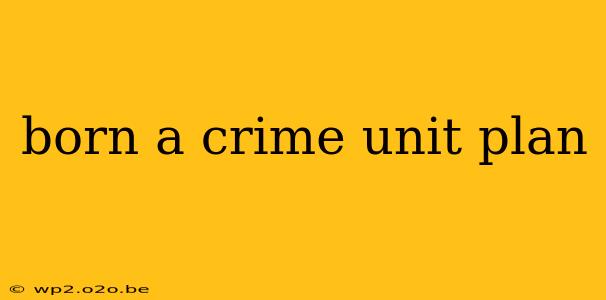This unit plan delves into Trevor Noah's memoir, Born a Crime, exploring themes of identity, apartheid, and resilience within the South African context. The plan is designed to engage students in critical thinking, creative expression, and a deeper understanding of historical and social issues.
Unit Overview:
Target Audience: High school students (adaptable for middle school with modifications)
Time Allotment: 4-6 weeks (adjustable based on class periods and student needs)
Essential Questions:
- How does one's identity shape their experiences and perspectives?
- What is the lasting impact of apartheid on individuals and society?
- How can individuals overcome adversity and find strength in challenging circumstances?
- What role does humor play in coping with difficult situations?
- How can storytelling contribute to social justice and understanding?
Learning Objectives: Students will be able to:
- Analyze the historical context of apartheid in South Africa.
- Identify and interpret key themes in Born a Crime.
- Evaluate the author's use of narrative voice and literary techniques.
- Critically assess the impact of social inequalities on individuals and communities.
- Develop empathy and understanding for diverse perspectives.
- Communicate their understanding through various forms of expression.
Unit Activities:
Week 1: Introduction to Apartheid and South Africa
- Activities: Introductory lecture/discussion on apartheid, its history, and its legacy in South Africa. Students will research and present on different aspects of apartheid (laws, social structures, resistance movements). View relevant documentaries or news clips.
- Assessment: Class participation, short research presentation.
Week 2-3: Reading and Analyzing Born a Crime
- Activities: Chapter-by-chapter reading of Born a Crime, focusing on key events, themes, and characters. In-class discussions and small group activities analyzing specific passages and their significance. Journaling prompts to encourage reflection on the reading.
- Assessment: Class participation, short written responses to reading prompts, in-class discussions.
Week 4: Exploring Themes
- Activities: Focus on specific themes (identity, race, class, religion, family, resilience, humor). Students will participate in debates, create presentations, or write essays exploring these themes through the lens of the book. Potential projects could include creating timelines, thematic maps, or presentations on specific chapters.
- Assessment: Debate participation, presentation, essay.
Week 5: Creative Expression
- Activities: Students will choose a creative project to demonstrate their understanding of the book and its themes. Options might include: creating a visual representation of a key scene, writing a poem or song inspired by the book, designing a poster advocating for social justice, or producing a short film based on a chapter.
- Assessment: Creative project presentation and reflection.
Week 6: Culminating Project & Reflection
- Activities: Students will complete a culminating project that synthesizes their learning throughout the unit. This could be a research paper, a multimedia presentation, or a creative project that explores a chosen theme in depth. A final class discussion will reflect on the overall themes and impact of the book.
- Assessment: Culminating project, final reflection essay.
Assessment Strategies:
- Formative Assessments: Class participation, in-class discussions, short written responses, journaling prompts.
- Summative Assessments: Research presentation, essay, creative project, culminating project, final reflection.
Differentiation:
This unit plan can be differentiated to meet the needs of diverse learners. For example:
- Reading Levels: Provide different versions of the text (abridged, audio book) for varying reading levels.
- Learning Styles: Offer a variety of activities to cater to visual, auditory, and kinesthetic learners.
- Support: Provide scaffolding and additional support for students who need extra help.
This detailed unit plan provides a framework for engaging students with Born a Crime and its powerful messages. Remember to adapt and adjust based on your specific classroom context and student needs. Remember to always consult your school's curriculum guidelines and standards.

